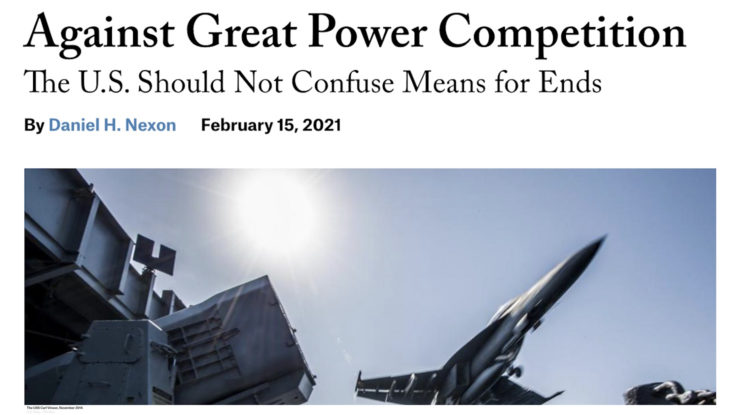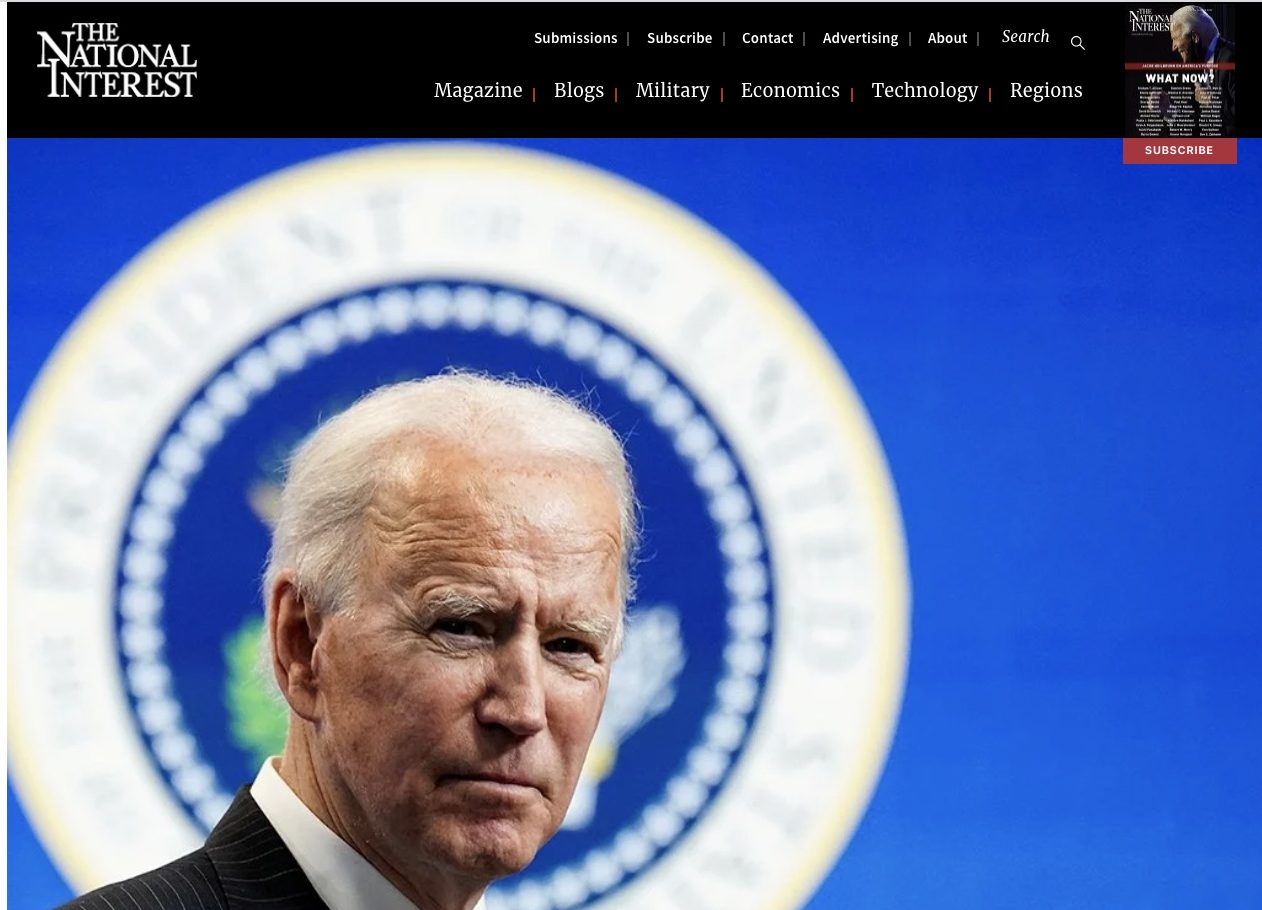
Dan has a brand new piece online at Foreign Affairs on why I’m extremely skeptical of the idea of “Great-Power Competition” as a strategic framework.
Great powers compete. The relative decline of the United States means that other great powers – notably rising ones, such as China – can compete more effectively than they could a ten or twenty years ago. But there’s nothing inevitable about the intensity of that competition.
It is one thing, though, for Washington to observe increasing competition among great powers and adjust to a world in which it enjoys less influence than it once did. It is another entirely to elevate competition itself to the guiding paradigm of U.S. foreign policy—as the Trump administration proposed and Biden may wind up doing. The mere fact of a more competitive international environment does not compel states to engage in unrelenting struggle.
In fact, if you look at the 2017 National Security Strategy you’ll get a sense of the tensions involved in claiming that the U.S. has no choice when it comes to intense great-power competition. According to the NSS:
China and Russia challenge American power, influence, and interests, attempting to erode American security and prosperity. They are determined to make economies less free and less fair, to grow their militaries, and to control information and data to repress their societies and expand their influence. At the same time, the dictatorships of the Democratic People’s Republic of Korea and the Islamic Republic of Iran are determined to destabilize regions, threaten Americans and our allies, and brutalize their own people. Transnational threat groups, from jihadist terrorists to transnational criminal organizations, are actively trying to harm Americans. While these challenges differ in nature and magnitude, they are fundamentally contests between those who value human dignity and freedom and those who oppress individuals and enforce uniformity.
So the world is one of relentless realpolitik because ideology drives foreign policy. But if ideology drives foreign policy then the world cannot be one of relentless realpolitik because value systems profoundly shape state behavior. As Christopher Layne notes, this is less clear-eyed realism than a call for an unfettered ideological crusade. Or, as I see it, it realism shorn of any of the good parts, such as a premium on prudence in foreign policy and a check on the worst impulses of American exceptionalism.
Obviously, this isn’t the approach of the Biden administration. But that only underscores the problem with the treating “GPC” as a framework: it doesn’t provide any real guidance at all.
There is no single grand strategy for eras of great-power competition. There are no instruments of statecraft that competition renders relevant or irrelevant. Great-power competition doesn’t even imply adopting a more antagonistic approach to rivals: as U.S. President Ronald Reagan and Soviet leader Mikhail Gorbachev realized by 1987, the best response to intensifying competition may be to dial tensions back through confidence-building measures and cooperation.
This is not to say that we don’t see more great-power competition, that the U.S. won’t need to engage in competition with other great powers, or that we shouldn’t take measures to improve the motors of American power. We should make major investments in human and physical capital; we should adopt more realistic levels of taxation; we should rebuild the U.S. social compact and deal with threats from domestic extremists; we should transition away from carbon energy sources. But we’d want to do those things even if the United States was facing a totally benign environment with respect to other great powers.
The downside risks of making “great-power competition” a lodestar of U.S. foreign policy are real.
Ultimately, competition isn’t a strategic goal. It’s a means to an end. The decision to compete with another great power should always be over something specific; it should center on the efficacy of competition (as opposed to a more cooperative approach), the value of the object at stake, and how the specific objective contributes to long-term goals.
For example, manyargue that the United States has a vital interest in preventing a single power from dominating Eurasia. With that in mind, U.S. policymakers can decide, for example, whether—and to what degree—competition with Russia over influence in Ukraine serves that goal and then adjust U.S. policy accordingly. But if, as the U.S. federally funded research center MITRE notes, great-power competition entails a constant “global struggle for military, economic, and ideological supremacy between the United States, Russia, and China,” with no separate strategic objective in mind, the means collapse into ends.
While its simply false to say that you can’t engage in even fairly robust competition with other states and still cooperate on matters of common interests, it is more difficult to cooperate if zero-sum competition dominates every issue area. Sometimes governments need to make concessions to get that cooperation rolling, and if all of Washington is beating the “GPC” drum that’s going to be very difficult to do.
And we do face a lot of challenges which will be easier to accomplish in the context of international cooperation.
Now, as readers know, I do think that competitive approaches are justified in a number of issue areas. I don’t think that the United States ought to trade away Taiwanese autonomy in the hopes of getting cooperation from Beijing on climate change. But we need to always ask “competition over what, and for what ends?” The more “GPC” becomes conventional wisdom, the harder that will be.
For what it’s worth, there was a useful conversation over at the Twitters and it reminds me that there is one domain in which I think “great-power competition” may make sense, and that’s in the context of defense planning and force structure. But even there we might be better off talking about “great-power relations.”



